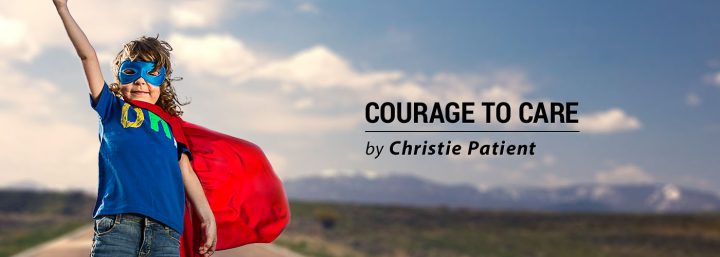Face-to-Face from Far Away: Tech to Help Weather the Wait

When my mom, Holly, had an acute exacerbation of her idiopathic pulmonary fibrosis, she was transported to the University of California, San Francisco (UCSF) Medical Center. She spent the first three weeks in the intensive care unit recovering enough to get on the lung transplant list. When at last she was listed, her lung allocation score (LAS) was high.
The LAS is a number from 1 to 100, determined by a set of health factors and necessity. In theory, the higher your LAS number, the closer you are to getting a lung transplant. But having the greatest need doesn’t mean you will get a transplant before someone healthier than you.
Contrary to popular belief, there is no such thing as “being first on the list.” Many variables are considered when placing organs, and many donors may pass before one matches the person with the highest LAS.
My mom’s LAS at the time of her listing was 88. Her doctors came in the day after she went on the list and asked if she would be prepared for a transplant that day if they found a match. Her need was so great that a close match would go to her over anyone with similar matching factors but a lower LAS.
Despite her transplant need being so great, once her health stabilized, I chose to return to my home in Washington state to wait for the call. I wanted to better prepare to live in San Francisco while acting as one of my mom’s caregivers, and I needed more than the one pair of pants I had with me.
I bought my plane ticket knowing that the call might come while I was on the two-hour flight. I was ready to get on a return flight to San Francisco without ever leaving Sea-Tac Airport.
The call did not come while I was in the air. It did not come the next day, later that week, or even that month. I spent all of February and half of March 2019 within arm’s reach of my phone. A packed suitcase sat by the door for seven weeks.
I operated under the assumption that a donor would be found. Had I had any doubts, I never would have gone back to Washington. The question was not if, but when. It was my truth, and I never let my thoughts stray far from that truth.
I video chatted with my mom almost every day. It started out of necessity when she couldn’t vocalize because of her tracheostomy. Over a video call, I could read her lips or her whiteboard. She eventually began to use a Passy-Muir valve and could speak for about an hour each day, but we continued to use video calls.
Choosing to video chat allowed me to see how she was doing and to stay connected when I wasn’t present. It was a huge comfort to see my mom and the people coming in and out of her room. We could send text messages all day, but I would never really know what was happening. With the visual element, I could read the people and the situation and see that things were stable. I had developed relationships with some of her nurses and doctors and it was nice whenever they made an appearance on our calls.
Video chatting was crucial for keeping my anxiety from creeping in while we were apart. Given the rapid decline in my mom’s health — and that I had learned transplant was an option as she was being medevaced to UCSF — I had a hard time trusting when people told me things were fine. Things had been fine right up until they were super-duper-not-fine, so assessing for myself was essential. Seeing was believing, and nothing else would suffice.
We both looked forward to our daily video call. It helped us stay calm and positive while we awaited the transplant call. We never thought it would take seven weeks to find a match, but staying in touch made the wait bearable.
I urge you to use technology to your advantage if you find yourself in a similar situation. Regular phone calls between Android devices can be turned into a two-way video. Apps such as FaceTime, Skype, Google Duo, or even Facebook Messenger allow you to put your best face forward for your loved ones while they’re in the hospital.
***
Note: Pulmonary Fibrosis News is strictly a news and information website about the disease. It does not provide medical advice, diagnosis, or treatment. This content is not intended to be a substitute for professional medical advice, diagnosis, or treatment. Always seek the advice of your physician or other qualified health provider with any questions you may have regarding a medical condition. Never disregard professional medical advice or delay in seeking it because of something you have read on this website. The opinions expressed in this column are not those of Pulmonary Fibrosis News or its parent company, Bionews Services, and are intended to spark discussion about issues pertaining to pulmonary fibrosis.








Ger McDonnell
Recently diagnosed with IPF...just reading and gathering as much information as I can! Thank you for sharing your story and thoughts on Video Messaging...whilst in the hospital I found the constant texting sometimes very overwhelming, I know friends and family mean well, but sometimes just to hear a voice or see a face can be just what you need! Hope your Mum is recovering well and that the lung transplant has given her a new lease of life!
Christie Patient
Hi Ger,
Thank you for sharing your experience. I know that writing constant texts and keeping in contact with people can be exhausting (even if you're not in the hospital). While I was in San Francisco with my mom, I was in charge of responding to her messages and keeping people in the loop. Reading her messages from friends aloud every day was a nice way to cheer her up and remind her that people were thinking of her, without her having to labor over responding to them all. Having a close person who's willing and able to video chat is definitely worth it. Like you said, seeing a face and hearing a voice from someone you love can do wonders.
I hope that you are feeling well and staying positive. Remember that there are lots of us here to support you as you go through your journey with IPF.
Christie
Holly W Patient
I loved the face- to- face while in the hospital, and think it would also be great for IPF patients and their families under circumstances other than hospitalization.
Christie Patient
I agree. I always write with the view that we shared--the quick crash course to lung transplant--but you are right that video chatting is a great way to stay connected in many circumstances. I wish we had used it more before you were in the hospital, and we should keep using it more often now :)
xo